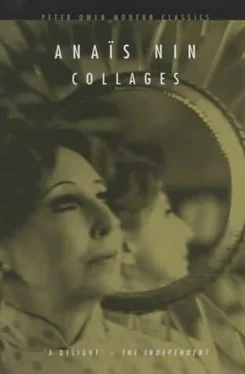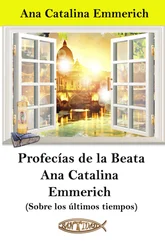A month later she received a letter:
“Dear Kind Friend: I will always remember you so gay and carefree in your orange dress. And how wise you were! If only I had listened to your warnings! I used the mineral water to wash the salty mist off my car, and so the first thing that happened was that I got the ‘tourista’ with a high fever. The captain kept his word to you and shared his cabin with me, but also with a barrel of fish, cans of gasoline, and hay for the animals. Then the sea got pretty rough and the car began to roll back and forth, and at each roll I thought it would plunge into the sea. I decided to sleep inside it, and if anything were to happen we would both go together. At the first town we stopped at, we took in a herd of cattle. They were crowded on deck, and they pushed against my car, dribbled on it, and even tried to gore it. At night they quarreled and I don’t need to describe the stench. The heat was as heavy as a blanket. At the second stop we took in a Madame and about twenty call girls who were being moved to another house. The captain gallantly offered his cabin. Tequila was free on board and so you can imagine how rowdy the nights were. After three weeks I arrived in Los Angeles a wreck, but my car is in fine shape. I had it lubricated and I wish you could hear it purr along the roads. Los Angeles has such wonderful roads.”
RENATE MOVED TO MALIBU, CALIFORNIA
Weeks later, when she was installed in her house, Bruce arrived, as if they had agreed to take a detour and resume their relationship. He laid his dusty and tired head on her shoulder and sought in the darkest part of her hair, at the base of her neck, the place where the nerves most clearly carried messages of future pleasures. His eyes were clear and innocent, free of memories. He smiled innocently, and settled in the house like a privileged guest, detached from the care of it. He took the cover off his typewriter, and then he gave her a few pages to read.
“That’s the beginning of my novel,” he said. And Renate read:
“The hotel in Acapulco was a series of cottages. It seems the ‘patron’ was quite a puritan and wanted no scandal, no extra visitors at night. It seemed that he patrolled the cottages at night himself. He wanted the place to remain a ‘family’ hotel.”
Renate interrupted with: “But that’s the hotel where I stayed.”
“Read on.”
“A woman arrived in an orange dress. It was not only the orange dress which aroused attention. She radiated joy and her laughter was warm and spontaneous. The patron knew she was alone and he often hovered around her cottage to catch the foreigner at some unholy hospitality. One night there was a man’s laughter mingled with hers, but the ‘patron’ did not hear it. A neighbor heard it. He stayed awake to listen, saying to himself he must warn the girl in the orange dress if the ‘patron’ came near. She was fortunate. The man remembered being all stirred up by the laughter, by the intimate quality of it. And the next morning he examined the girl in the orange dress with more attention, as if he had failed to notice in her face or in her behavior what would create such laughter at night. She was having breakfast, with her eyelids lowered. And then a chambermaid came in, breathless, and talked to the ‘patron,’ and the ‘patron’ came and talked to the girl in the orange dress, and the girl got up blushing and rushed away. It seems that she had left the visitor early in the morning, that he was to have dressed quietly, unobtrusively, and be gone by the time she came back. But as she left, she unconsciously locked the screen door and imprisoned him, so that he had to call the maid, and the maid, thinking she had trapped a bootlegged occupant had reported him while he rattled the door in anger and thus let everyone know…”
Renate began to laugh. She laughed until Bruce began to laugh with her, though he was not as certain of the meaning of the incident as she was.
She saw that he was laughing from contagion, with trust in her comic spirit, and this made her laugh all the more as a touching form of love.
“I must have been thinking of you, Bruce. You, and how quietly you slipped away at night. It must have been you I wanted to lock up!”
“Did you love him?”
Renate laughed. “He looked like Pinocchio at the piano, but sang like Caruso, only more lightly. He was just back from visiting his mother, so beautiful he said, with a luminous skin and eyes just like mine. He had her all to himself, he told me, his brothers and sisters being married, and he loved her, he realized he loved her (and me because I resembled her) so much in the way Freud said!”
A few days later she brought Bruce a peace dove she had found pinned to the wall of a Swedish shop. It was carved out of paper-thin wood with transparent wings as light as a breath.
Renate said: “Let’s hang it up by a thread so it will spin.”
Bruce climbed on a ladder and began to hang it up. He asked Renate for thread which she brought him. It broke. The peace dove fell to the ground. Bruce said: “Now I know why my buttons never stay on. You sew them with such a weak thread.”
Renate brought stronger thread. She went to light a fire in the fireplace. She prepared dinner. She prepared food for the dogs, Tequila and Sake.
“Why didn’t you buy a whole flock of doves? I would have liked a whole flock of doves flying around the room.”
“A whole flock of doves wouldn’t bring peace to our relationship.”
“You know the consequences of opening Pandora’s box,” he said.
“You never give me any warning of your departures. You call all amenities balls and chains. You take the only car we have so that I cannot even escape.”
“To find other Pinocchios?”
“To find anything that will make me forget you.”
“You know that what I give to others is nothing I take away from you, nothing that belongs to our relationship.”
“But Bruce, it’s not what you give to others which hurts me, but what you don’t give to me, your secrets.”
The big log in the fireplace was damp and smoked so heavily that Renate had to open the doors and windows. They both stood shivering in the cold wind that blew from the sea.
Renate said: “I’ve always loved garden parties.”
“Let me tell you my dream. I was listening to music. My body became compressed into a column. At the top of this column grew antennae of science fiction design which threw lassos of blue electric lights in circles. In their centrifugal motion they captured other waves. The waves of the brain? Seeking to contact other vibrations? The radiations of my brain not only designed fever charts but they were neon-lighted and threw off sparks like electric short circuits.”
Consolation was a Christian act, not Pan’s profession. Bruce could only smile when she could not laugh quickly enough to give her threatening tears time to evaporate. This time they rose to a dangerous water level.
“We can’t live our Mexican life here,” said Bruce. “Let’s get a sailboat and sail around the world. You can paint while we’re traveling and I will write my novel. I saw an advertisement that sailboats are very cheap in Holland, and they sell a kind of sailboat which can travel both by sea and by river. I will learn to sail it. You rent the house and meet me in Holland when I am ready.”
“I can’t imagine you as a captain of a sailboat.”
But she felt that perhaps this was the mobility Bruce needed, the fluid, changing, variable way he wanted to live.
He was gone for a month. In his letters he described the old captain who had sold him a sailboat and who was teaching him to run it. The sailboat had a motor too, in case they were becalmed. There was only room for two on the boat so the old captain would not sail with them. But by the time she arrived Bruce felt he could handle it alone.
Читать дальше












